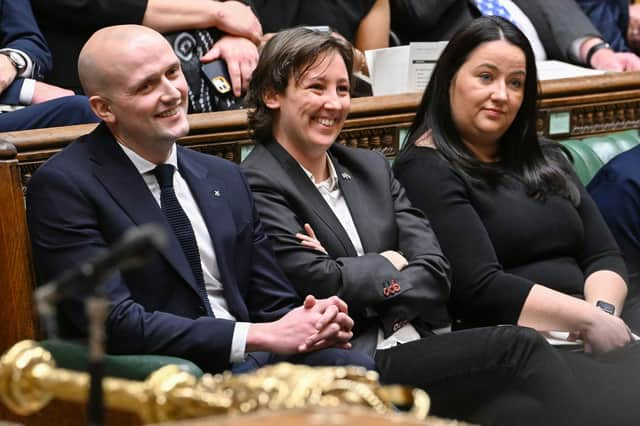Why Stephen Flynn and SNP leadership coup could prove costly for Nicola Sturgeon - Euan McColm


This experiment was never carried out but those of us old enough to remember some of the second-raters sent south to Westminster in the days when Labour dominated our politics know that the party came close to testing the proposition.
After several decades as, by far, the largest party in Scotland, Labour grew complacent. A sense of entitlement pervaded its ranks.
Advertisement
Hide AdAdvertisement
Hide AdWhen the SNP accused Labour of taking Scottish voters for granted, there was more than a grain of truth in the charge.
That accusation flows in the opposite direction, these days. It is the SNP that assumes it will win each election.
There is now a generation of SNP politicians who have never known anything but success. Among that cohort is the party’s new Westminster leader, Stephen Flynn, who - after a swift and brutal coup - succeeded Ian Blackford.
Flynn, 34, was a 19-year-old student when the SNP won its first Holyrood election in 2007. By the time he’d graduated and begun dabbling in the political world, the nationalists had comfortably supplanted Labour as the largest party in Scotland.
Amid talk of tension between Flynn and First Minister Nicola Sturgeon, I think their very different formative political experiences are significant. Sturgeon knows defeat, she knows the humiliation of rejection at the ballot box and - importantly - she used these experiences to become a better politician.
Flynn, on the other hand, has only ever known political success. He came of age in a party turned into a winning machine by Sturgeon and her mentor, Alex Salmond.
The SNP’s new Westminster leader can hardly be blamed for never having tasted failure but it would have done him some good.
Flynn’s decision to challenge for the Westminster leader’s position was driven, say party insiders, by the feeling that Sturgeon was a distant figure, unwilling to collaborate with any but those who have been closest to her for decades.
Advertisement
Hide AdAdvertisement
Hide AdOne SNP activist described the situation to me thus: “You’ve got all these young MPs who think because they won their seats that they’re something special. They look at Sturgeon and they feel unloved and then they ask themselves why she hasn’t delivered another referendum despite promising them she would and so they reckon maybe they could do better.”
This, I think, if a fair summary of growing tensions in the SNP.
And, when it comes to feeling unloved, the new breed has a point. Sturgeon has never been much of a reacher-out in her party. She has certain long-standing relationships and she prefers to nurture those than to forge new bonds.
It would have been beneficial to Sturgeon if she had made an effort to create new relationships. Perhaps, for one thing, she wouldn’t now have a Westminster leader who’s a little sceptical about her strategy.
That activist sums things up better than I could: “Because she hasn’t brought these new faces into the inner circle, they think there’s something going in behind closed doors. They wonder whether Nicola’s being straight with them and they reckon maybe there’s another route to a referendum that she’s not explored.
“If she’d tickled their tummies a bit more, then Ian Blackford would still be Westminster leader.”
If Sturgeon cannot find it in herself to make Flynn feel part of the project, she may live to regret it. She will have to persuade him and those who supported his leadership bid that there is no secret solution to achieving a referendum. Crucially, she will have to discourage her new colleague from taking a different approach to the constitutional battle.
Some SNP politicians believe Sturgeon has been too cautious in the independence fight. They’d like a lot more Braveheart and a lot less bureaucrat.
Advertisement
Hide AdAdvertisement
Hide AdThis would be a mistake. The already converted may lap up bullish declarations of Scottish exceptionalism but those the SNP must convince if it is ever to win a second referendum would like a lot more calm attention to detail and a damned sight less triumphalist flag-waving.
For the first time since she became SNP leader, Sturgeon has not got things her own way. When Angus Robertson lost his Westminster seat in 2017, Blackford was Sturgeon’s preferred candidate to succeed him. Just two weeks ago, the SNP leader knobbled an attempt by Flynn to replace Blackford.
That Flynn quickly decided to restart his leadership campaign tells us that Sturgeon’s grip on her party is not what it once was.
The departure from the Westminster front bench of Sturgeon loyalists such as Pete Wishart and Stewart McDonald suggests the risk of a more serious split in the SNP is very real indeed.
The timing could hardly be worse. After the UK’s Supreme Court confirmed that the Scottish Government had no power to stage a vote on the constitution, Sturgeon declared that the next UK General Election would be a “de facto” referendum.
It will be no such thing - Nicola Sturgeon cannot declare it so - but the result of the election will decide whether the SNP’s dream of Indyref2 lives or dies. Even If the SNP wins more than half of the popular vote, it won’t have the right to begin talks about breaking up the UK but such a result would make it very difficult for the UK Government to deny a second referendum.
The SNP needs unity, right now. This being so, Stephen Flynn’s leadership coup looks like the sort of self-indulgence that ended up costing Labour dear.
Comments
Want to join the conversation? Please or to comment on this article.